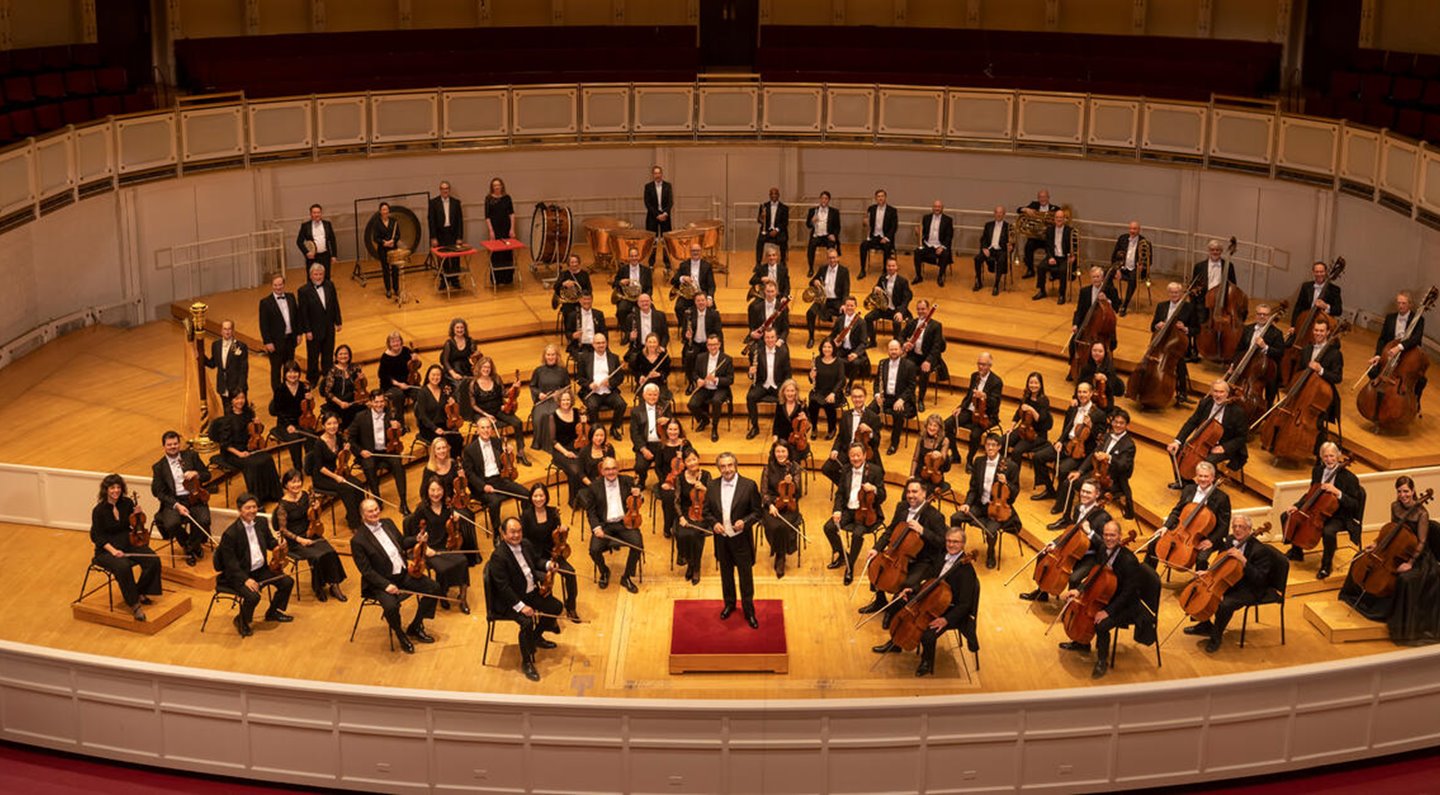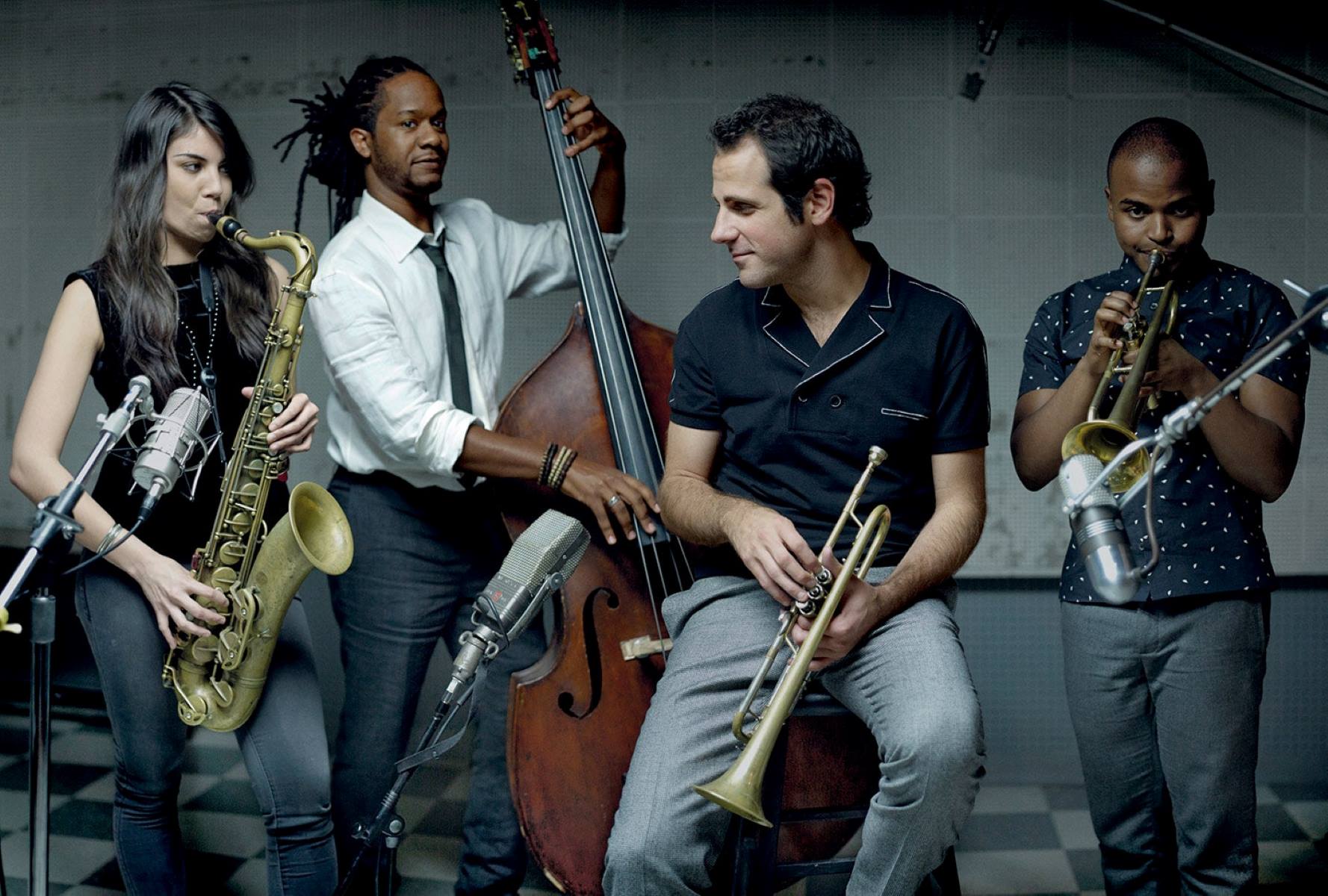Home>Production & Technology>Musician>How To Be A Successful Musician


Musician
How To Be A Successful Musician
Modified: January 28, 2024
Discover the secrets to becoming a successful musician and unlock your potential. Learn proven strategies and gain insights from industry experts. Start your musical journey today!
(Many of the links in this article redirect to a specific reviewed product. Your purchase of these products through affiliate links helps to generate commission for AudioLover.com, at no extra cost. Learn more)
Table of Contents
- Introduction
- Finding Your Passion for Music
- Developing Your Musical Skills
- Building a Strong Work Ethic
- Creating a Personal Brand
- Networking in the Music Industry
- Taking Advantage of Social Media
- Promoting Your Music
- Building a Fanbase
- Collaborating with Other Musicians
- Handling Rejection and Criticism
- Dealing with the Challenges of the Music Industry
- Staying Motivated and Persistent
- Seeking Opportunities for Growth
- Conclusion
Introduction
Music has the power to move us, inspire us, and connect us on a universal level. For many, the dream of becoming a successful musician is one that ignites a deep passion and a desire to share their art with the world. Whether you’re a singer, instrumentalist, or songwriter, embarking on a career in music can be an exhilarating and rewarding journey.
However, it’s important to recognize that being a successful musician goes beyond talent alone. It requires dedication, perseverance, and a willingness to constantly evolve and adapt in an ever-changing industry. In this article, we will explore the key steps and strategies to help you navigate the path to success in the music world.
From discovering your true passion for music to building a fanbase and dealing with the challenges along the way, this guide will provide you with valuable insights and practical tips to help you achieve your goals as a musician.
So, if you’re ready to embark on this exciting adventure, let’s dive in and learn what it takes to become a successful musician!
Finding Your Passion for Music
Before embarking on a journey to become a successful musician, it’s crucial to first identify and nurture your passion for music. Passion is the driving force that will sustain you through the highs and lows of your musical career.
Start by reflecting on what drew you to music in the first place. Was it the joy of singing, the thrill of playing an instrument, or the emotion that music evokes? Understanding your underlying motivation will help you stay focused and committed to your musical goals.
Take the time to explore different genres and styles of music. Experiment with various instruments and techniques to discover what resonates with you the most. Attend concerts, listen to podcasts, and read books on music to expand your knowledge and fuel your passion.
Additionally, consider seeking guidance from mentors or music teachers who can provide valuable insights and help you refine your skills. Surrounding yourself with passionate and knowledgeable individuals can inspire you and push you to continuously improve.
It’s important to remember that finding your passion for music is a personal journey, and there is no right or wrong path. Trust your instincts and listen to your heart when making decisions about your musical direction. Stay true to your unique voice and style, and don’t be afraid to be authentic and different.
Ultimately, finding your passion for music is about connecting with your innermost emotions and expressing them through your art. Embrace the joy and love that music brings to your life, and let it guide you on your path to success.
Developing Your Musical Skills
As a musician, continuously honing and expanding your musical skills is instrumental in your journey towards success. Here are some key steps to help you develop and refine your musical abilities:
- Practice regularly: Dedicate consistent time to practice your instrument or voice. Set specific goals and create a practice routine that allows you to work on technique, musicality, and repertoire.
- Take lessons: Consider working with a skilled music teacher who can provide guidance and help you progress faster. They can offer personalized instruction, identify areas for improvement, and provide valuable feedback.
- Study music theory: Understanding music theory will deepen your knowledge of how music works. It will enhance your ability to compose, improvise, and analyze music, ultimately making you a more well-rounded musician.
- Expand your repertoire: Explore different styles and genres of music to broaden your musical horizons. Learn and perform a diverse range of songs to develop versatility and adaptability as a musician.
- Collaborate with other musicians: Jamming and performing with other musicians allows you to learn from their unique perspectives and styles. It fosters creativity, improves your improvisation skills, and opens doors to new opportunities.
- Attend workshops and masterclasses: Take advantage of the countless educational opportunities available in the music community. Attend workshops, masterclasses, and music festivals to learn from experienced professionals and gain new insights.
- Record and listen to yourself: Record your practice sessions or performances to evaluate your progress objectively. Listening to recordings allows you to identify areas that need improvement and serves as a tool for self-assessment.
- Seek feedback and be open to criticism: Share your music with trusted friends, fellow musicians, or mentors and ask for their honest feedback. Constructive criticism can help you identify blind spots and areas for growth.
Remember, developing your musical skills is a lifelong journey. Embrace the process, be patient with yourself, and celebrate small victories along the way. With dedication and perseverance, your skills will continually improve, propelling you closer to achieving success as a musician.
Building a Strong Work Ethic
A strong work ethic is essential for any aspiring musician who wants to succeed. It is the foundation upon which you’ll build your musical career. Here are some tips to help you cultivate a strong work ethic:
- Set clear goals: Define your short-term and long-term goals as a musician. Having a clear vision of what you want to achieve will provide focus and direction, motivating you to work diligently.
- Create a schedule: Establish a structured practice schedule and stick to it. Treat your music career as a profession and allocate specific hours each day for practice, songwriting, and other career-related activities.
- Practice discipline: Show up consistently and put in the effort even when you may not feel motivated. Develop the discipline to work through challenges, setbacks, and plateaus in your musical journey.
- Embrace constructive criticism: Be open to feedback from experienced musicians, teachers, and mentors. Embracing constructive criticism will help you identify areas for improvement and grow as a musician.
- Stay organized: Keep track of your progress, practice sessions, and goals. Maintain a practice journal to record what you’ve worked on, what techniques you’ve mastered, and any new ideas or inspirations.
- Continuously learn and evolve: Stay curious and always seek opportunities to learn and grow. Take courses, attend workshops, and explore new musical styles to broaden your knowledge and skills.
- Manage your time effectively: Prioritize your tasks, eliminate distractions, and manage your time efficiently. This will allow you to make the most of your practice sessions and allocate time for networking and career-building activities.
- Stay committed and resilient: The road to success in the music industry can be challenging and unpredictable. Maintain a strong commitment to your craft, and develop resilience to overcome obstacles and persevere through tough times.
Building a strong work ethic takes time and dedication, but it will set you apart from others in the music industry. Remember that success is not solely dependent on talent, but also on the effort and dedication you put into your craft. With a strong work ethic, you’ll be well-equipped to navigate the competitive music industry and achieve your goals.
Creating a Personal Brand
In today’s digital age, creating a strong personal brand is crucial for success as a musician. Your personal brand is what sets you apart from other artists and communicates your unique identity and style to the world. Here are some steps to help you develop and enhance your personal brand:
- Define your brand identity: Start by determining what makes you unique as a musician. Identify your values, aesthetic, and the overall message you want to convey through your music.
- Create a compelling bio: Craft a concise and engaging biography that captures the essence of who you are as an artist. Highlight your achievements, musical influences, and any notable performances or collaborations.
- Design a cohesive visual identity: Develop a consistent and visually appealing aesthetic that reflects your musical style. This includes your logo, album artwork, website design, and social media graphics.
- Have a professional online presence: Maintain an up-to-date and user-friendly website that showcases your music, upcoming shows, and other relevant information. Establish active profiles on social media platforms to connect with your audience and share updates about your musical journey.
- Engage with your fans: Interact with your fans on social media, respond to comments and messages, and show appreciation for their support. Building strong connections with your audience can help foster loyalty and attract new listeners.
- Collaborate with influencers and other artists: Seek collaborations with influencers in your genre or other musicians to expand your reach and gain exposure to new audiences. This can be through joint performances, features on each other’s songs, or cross-promotion on social media.
- Create consistent and high-quality content: Regularly release new music, share behind-the-scenes footage, and provide exclusive content to your fans. This demonstrates your dedication to your craft and keeps your audience engaged.
- Establish your brand story: Share your musical journey and personal experiences through storytelling. Connect with your audience by expressing vulnerability, triumphs, and the lessons learned along the way.
Remember, a strong personal brand is built over time and requires authenticity, consistency, and a clear understanding of who you are as an artist. Stay true to yourself and your artistic vision, and let your personal brand resonate with your audience in a meaningful way. By creating a compelling personal brand, you increase your chances of standing out in the music industry and attracting opportunities for success.
Networking in the Music Industry
Networking is a crucial aspect of building a successful career in the music industry. It allows you to connect with industry professionals, fellow musicians, and potential collaborators. Here are some tips to help you navigate the world of music networking:
- Attend music events and conferences: Regularly attend local and industry-wide music events, conferences, and workshops. This provides opportunities to meet and connect with like-minded individuals who share your passion for music.
- Join music organizations and associations: Become a member of music organizations or associations that align with your musical genre or interests. These groups often host networking events and provide resources to facilitate connections within the industry.
- Utilize social media: Engage with fellow musicians and industry professionals on platforms like Instagram, Twitter, and LinkedIn. Connect with musicians, producers, agents, and other important figures in the industry to expand your network.
- Reach out to industry professionals: Don’t hesitate to contact industry professionals such as managers, booking agents, and record label representatives. Introduce yourself, explain your goals, and express your interest in collaborating or working together.
- Build genuine relationships: Networking is not just about promoting yourself; it’s about building meaningful relationships. Take the time to get to know others, show support for their music, and offer assistance when possible.
- Be prepared with your elevator pitch: Craft a concise and compelling elevator pitch that clearly communicates who you are as an artist. This will help you make a memorable impression when networking opportunities arise.
- Collaborate with other musicians: Collaborations provide valuable networking opportunities and can help you expand your reach. Look for opportunities to collaborate on recordings, performances, or songwriting sessions with other talented musicians.
- Follow up: After meeting someone in the industry, always follow up with a personalized thank-you email or message. Building genuine and lasting connections requires ongoing communication.
- Offer value to others: Networking is a two-way street. Look for ways to provide value to others in your network by offering support, sharing resources, or promoting their work. The more you give, the more you’ll receive in return.
Remember, networking is about building mutually beneficial relationships and creating a support system within the music industry. Approach networking with authenticity and a genuine interest in connecting with others. By expanding your network, you open doors to new opportunities, collaborations, and potential avenues for success in your music career.
Taking Advantage of Social Media
In today’s digital age, social media platforms have become powerful tools for musicians to reach and engage with their audience. Here are some key strategies to effectively leverage social media for your music career:
- Choose the right platforms: Identify the social media platforms that align with your target audience and musical genre. Focus on building a strong presence on platforms like Instagram, YouTube, Facebook, or Twitter.
- Create a compelling profile: Craft a captivating bio and choose high-quality profile and cover photos that visually represent your brand. Your profile should clearly communicate who you are as an artist and what you offer.
- Consistently share content: Regularly post content that showcases your music, behind-the-scenes footage, live performances, and other engaging content. Be consistent with your posting schedule to keep your audience engaged.
- Engage with your audience: Respond to comments, messages, and mentions from your fans. Show genuine appreciation for their support and make an effort to connect with them on a personal level. Building strong relationships with your fans will foster loyalty and help grow your fanbase.
- Collaborate with influencers: Collaborating with influencers in your genre or related fields can help expose your music to new audiences. Look for opportunities to feature on their channels, participate in joint live streams, or create content together.
- Use hashtags strategically: Incorporate relevant hashtags in your posts to increase discoverability. Research popular hashtags in your genre and experiment with a mix of broad and niche tags to reach the right audience.
- Promote your music: Utilize social media platforms to promote your music releases, whether it’s singles, albums, or music videos. Share previews, behind-the-scenes stories, and encourage your followers to listen, share, and support your work.
- Run contests and giveaways: Engage your audience by running contests or giveaways exclusive to your social media platforms. This encourages interaction, boosts engagement, and rewards your fans for their support.
- Collate user-generated content: Encourage your fans to create and share their own content related to your music. Repost and share their content on your social media platforms, showing appreciation for their support and fostering a sense of community.
- Monitor analytics and adapt: Pay attention to social media analytics to understand what type of content resonates most with your audience. Use this data to refine your social media strategy and adapt your content accordingly.
While social media can be a powerful tool, it’s important to strike a balance. Focus on creating meaningful and authentic connections with your audience rather than solely focusing on likes and followers. Use social media as a tool to engage, inspire, and build a loyal fanbase that will support you on your musical journey.
Promoting Your Music
Promoting your music is essential for gaining visibility, attracting new listeners, and growing your fanbase. Here are some effective strategies to promote your music:
- Create a professional press kit: Compile a press kit that includes your bio, high-resolution photos, music samples, and any notable press coverage or achievements. This will make it easier for journalists, bloggers, and industry professionals to learn about you and potentially feature your music.
- Submit your music to music blogs and playlists: Research and reach out to music blogs and curators who specialize in your genre. Submit your music for potential reviews, features, or playlist placements. Building relationships with influencers in the music blogging community can help expose your music to wider audiences.
- Utilize streaming platforms: Upload your music to popular streaming platforms like Spotify, Apple Music, and SoundCloud. Create engaging artist profiles, optimize your music descriptions, and regularly update your releases to engage listeners and increase discoverability.
- Collaborate with influencers and fellow musicians: Collaborating with influencers or musicians who have a larger following can help expose your music to their audience. Participate in collaborative projects, guest features, or live performances to expand your reach and attract new fans.
- Host live performances and gigs: Arrange live performances at local venues, music festivals, or even through virtual platforms. Performing in front of an audience allows you to connect with people on a personal level and generate buzz around your music.
- Create compelling visuals: Invest in high-quality music videos, lyric videos, and visual content that enhance the listening experience and resonate with your audience. Engaging visuals can capture attention, generate interest, and leave a lasting impression.
- Engage with your local community: Connect with local businesses, radio stations, and event organizers to explore opportunities for collaborations and performances. Engaging with your local community can help you build a strong foundation of support and establish a local fanbase.
- Take advantage of social media advertising: Utilize targeted social media advertising to reach a wider audience. Experiment with sponsored posts, targeted ads, and ad campaigns to raise awareness about your music and attract new listeners.
- Participate in music competitions and showcases: Enter reputable music competitions and showcases to gain exposure and potentially catch the attention of industry professionals. Winning or even being a finalist in these competitions can provide valuable opportunities for further promotion.
- Stay active on music forums and online communities: Engage in music-related forums, online communities, and social media groups. Participating in discussions, sharing your insights, and promoting your music in a genuine and non-spammy way can help you connect with fellow musicians and potential fans.
Consistency is key when promoting your music. Develop a comprehensive marketing plan that combines online and offline strategies, and be proactive in seeking opportunities to showcase your talent. Remember, promoting your music is an ongoing effort that requires continuous engagement and adaptability, but the rewards can be immense in reaching new listeners and building a dedicated fanbase.
Building a Fanbase
Building a loyal and engaged fanbase is crucial for long-term success as a musician. Your fans are not only the individuals who appreciate your music, but they also become your advocates, spreading the word about your music and supporting you along your journey. Here are some strategies to help you build a strong and dedicated fanbase:
- Connect with your audience on a personal level: Engage with your fans through social media, email newsletters, and live performances. Respond to their messages, comment on their posts, and make an effort to create meaningful connections.
- Offer exclusive content and experiences: Reward your devoted fans by providing exclusive content, such as behind-the-scenes footage, unreleased music, or early access to new releases. Create special experiences, such as meet and greets or intimate performances, to make your fans feel valued and appreciated.
- Encourage fan-generated content: Inspire your fans to create and share their own content related to your music. This can include fan covers, artwork, or dance routines. Recognize and appreciate their efforts by sharing their content on your social media platforms.
- Utilize fan engagement platforms: Take advantage of online platforms that encourage fan engagement, such as Patreon or similar crowdfunding platforms. Offer exclusive perks and opportunities to fans who support you financially, creating a closer bond with your most dedicated fans.
- Organize fan contests and giveaways: Run contests or giveaways that allow your fans to win merchandise, concert tickets, or personalized experiences. Contests generate excitement and encourage fans to actively participate and promote your music to others.
- Perform live shows regularly: Perform live shows on a regular basis, both locally and in other cities. Engage with your audience during and after performances, and create memorable experiences that leave a lasting impact. A captivating live show can turn casual listeners into devoted fans.
- Collaborate with your fans: Involve your fans in your music-making process whenever possible. Seek their input on songwriting, ask for feedback on unreleased material, and make them feel like they are an integral part of your musical journey.
- Use data and analytics: Leverage data and analytics from social media platforms and music streaming services to better understand your audience. Identify demographics, popular songs, and regions where your music is gaining traction. Tailor your promotions and engagement accordingly.
- Stay active and consistent: Regularly release new music, update your social media channels, and communicate with your fans. Consistency is key in building and maintaining a fanbase. Keep your audience engaged and excited about your music.
- Show genuine appreciation: Never underestimate the power of gratitude. Show genuine appreciation for your fans’ support by publicly acknowledging and thanking them. Make them feel like an essential part of your musical journey.
Building a fanbase takes time, effort, and genuine connection. Focus on engaging with your audience, providing value, and building relationships based on mutual support and appreciation. By nurturing and expanding your fanbase, you’ll have a solid foundation of dedicated fans who will champion your music, amplify your reach, and ensure your long-term success as a musician.
Collaborating with Other Musicians
Collaboration with other musicians can be a powerful way to expand your creativity, reach new audiences, and gain valuable insights. Here are some reasons why collaborating with other musicians can greatly benefit your music career:
- Fresh perspectives and ideas: Collaborating with other musicians exposes you to new musical styles, techniques, and perspectives. It can lead to unexpected and exciting creative breakthroughs, pushing you to explore new musical territories.
- Expand your network: Collaborating allows you to tap into the existing fanbase of the artists you collaborate with, introducing your music to their audience. This can significantly increase your exposure and attract new listeners who may become fans of your work.
- Learn and grow: Collaborating with musicians who possess different skills and expertise than you can be a valuable learning experience. It provides an opportunity to exchange knowledge, learn new techniques, and enhance your own musical abilities.
- Spark inspiration: Working with other musicians can reignite your creative spark. The synergy and energy generated in a collaborative environment can inspire you to create music that you might not have explored on your own.
- Combine strengths: Collaborating allows you to pool your strengths and talents with others, resulting in a more powerful and polished final product. By leveraging each other’s strengths, you can create music that is richer and more captivating.
- Access to new opportunities: Collaborating opens doors to new performance opportunities, joint projects, and even potential endorsements or sponsorships. It expands your professional network and can lead to connections with industry professionals and influencers.
- Build a supportive community: Collaborations can foster a sense of community and camaraderie among musicians. Building positive relationships with fellow musicians creates a support system and opportunities for future collaborations or referrals.
- Gain valuable feedback: Working closely with other musicians allows for constructive feedback and critique. This can help refine your skills, improve your performance, and push you to new creative heights.
- Embrace diversity: Collaborations encourage the celebration of diversity in music. Working with artists from different backgrounds or genres can result in unique and exciting musical fusions that appeal to a diverse range of listeners.
- Create memorable experiences: Collaborations can result in memorable live performances or recorded projects that stand out in the minds of your audience. These memorable experiences can leave a lasting impact on both you and your listeners.
When approaching collaborations, ensure that it is a mutually beneficial partnership grounded in respect and shared artistic vision. Collaborating with other musicians can be a transformative experience for your music career, allowing you to grow as an artist, reach new audiences, and create memorable music that resonates with listeners.
Handling Rejection and Criticism
Rejection and criticism are inevitable aspects of a career in music, but how you handle them can greatly impact your growth and resilience as an artist. Here are some strategies to help you navigate and overcome rejection and criticism:
- Develop a growth mindset: Embrace the mindset that challenges and setbacks are opportunities for growth. Instead of viewing rejection or criticism as personal failures, see them as chances to learn, improve, and refine your craft.
- Separate yourself from your art: Remember that criticism is not a reflection of your worth as a person. Separate yourself emotionally from your music and approach feedback with an open mind, focusing on constructive aspects that can help you grow as an artist.
- Seek constructive criticism: Seek out honest and constructive feedback from trusted sources such as mentors, fellow musicians, or industry professionals. Engage in discussions that help you understand different perspectives and identify areas for improvement.
- Use rejection as motivation: Allow rejection to fuel your motivation and determination. Use it as an opportunity to reflect on your goals, refine your approach, and push yourself to work even harder towards achieving success.
- Embrace self-reflection: Take the time to reflect on your music, performance, and artistic choices. Use criticism as a catalyst for self-improvement, examining areas where you can grow and develop your skills further.
- Stay true to your artistic vision: While it’s important to be open to feedback, it’s equally important to stay true to your artistic vision. Remember that not all criticism is valid or aligned with your unique style. Trust your instincts and embrace your individuality.
- Cultivate a support system: Surround yourself with a supportive network of fellow musicians, friends, and family who believe in your talent and vision. They can provide valuable emotional support and encouragement during times of rejection or criticism.
- Focus on your achievements and growth: Take stock of your accomplishments and recognize your progress as an artist. Celebrate milestones, big or small, to remind yourself of your talent and dedication.
- Practice self-care: Take care of your mental and emotional well-being. Engage in activities that recharge you, whether it’s exercise, listening to music, spending time in nature, or practicing mindfulness. Taking care of yourself will help you bounce back from rejections or criticism in a healthier way.
- Keep persevering: Understand that rejection and criticism are part of the journey towards success. Use them as opportunities to learn, improve, and strengthen your resilience. Keep pushing forward and stay committed to your passion.
Remember, every successful musician has faced obstacles and setbacks along the way. It’s how you handle and learn from rejection and criticism that defines your growth as an artist. Stay focused, keep an open mind, and use these experiences as stepping stones towards achieving your musical goals.
Dealing with the Challenges of the Music Industry
The music industry can be a challenging and competitive landscape, but with the right mindset and strategies, you can navigate these hurdles and thrive as a musician. Here are some ways to overcome the challenges of the music industry:
- Stay true to yourself and your art: The music industry often pressures artists to conform to certain trends or genres. However, staying true to your unique sound and artistic vision is essential for authenticity and long-term success. Embrace your individuality and create music that resonates with your true self.
- Develop a strong support system: Surround yourself with a supportive network of fellow musicians, mentors, friends, and family who understand the challenges of the industry. They can provide guidance, encouragement, and valuable advice to help you navigate difficult times.
- Embrace a resilient mindset: Recognize that setbacks and rejections are part of the journey. Develop resilience and use challenges as opportunities for growth. Instead of getting discouraged, focus on learning, improving, and pushing forward.
- Be adaptable to change: The music industry is constantly evolving, and it’s important to embrace change and adapt to new technologies, trends, and platforms. Stay informed about industry developments and be open to exploring innovative ways to reach your audience.
- Network and build relationships: Forge connections with industry professionals, fellow musicians, and influencers. Attend music events and conferences, join online communities, and actively engage with others in the industry. Building strong relationships can lead to opportunities for collaboration, mentorship, and career growth.
- Continue learning and growing: The pursuit of knowledge and skill development is key in overcoming challenges. Invest in your musical education through workshops, courses, and self-study. Adapt to new technologies and explore different aspects of the industry to stay relevant and expand your skillset.
- Manage your finances: Financial challenges can be a reality in the music industry, particularly in the early stages of your career. Develop good financial habits, budget wisely, and seek opportunities for financial stability, such as royalties, performance fees, and merchandise sales.
- Take care of your mental and physical well-being: The music industry can be demanding and stressful. Prioritize self-care to maintain your health and well-being. Practice stress-management techniques, get enough rest, exercise regularly, and seek support when needed.
- Stay persistent and patient: Success in the music industry takes time and perseverance. Stay focused on your goals, celebrate small victories along the way, and remain patient during the ups and downs of your musical journey.
- Stay informed about legal and business aspects: Educate yourself on the legal and business aspects of the music industry to protect your rights and interests. Understand copyright, licensing, contracts, and royalties to ensure that you are being fairly compensated for your work.
Remember, the challenges you face in the music industry are opportunities for growth and development. Stay grounded in your passion, maintain a positive mindset, and continue to hone your craft. By embracing these challenges and staying committed to your musical journey, you can overcome obstacles and achieve success in the ever-evolving music industry.
Staying Motivated and Persistent
Maintaining motivation and persistence is crucial in the music industry, where challenges and setbacks are often part of the journey. Here are some strategies to help you stay motivated and persistent on your musical path:
- Set meaningful goals: Define clear and realistic short-term and long-term goals for your music career. Goals give you direction and something to strive for, keeping you motivated and focused.
- Celebrate small victories: Acknowledge and celebrate your achievements along the way, no matter how small they may seem. Recognizing your progress boosts your confidence and fuels your motivation to keep going.
- Surround yourself with positive influences: Surround yourself with positive and supportive people who believe in your talent and dreams. Their encouragement and constructive feedback will help you stay motivated even in challenging times.
- Seek inspiration: Seek inspiration from other musicians, artists, and creative individuals. Listen to a variety of music, attend concerts, read books, and immerse yourself in art to fuel your creativity and keep your passion alive.
- Create a healthy work-life balance: Balance your music career with other aspects of your life. Make time for self-care, hobbies, and spending quality time with loved ones. Taking breaks and maintaining balance prevents burnout and helps you stay motivated in the long run.
- Practice discipline and consistency: Treat your music career as a job and commit to practicing and working on your craft consistently. Even on days when you don’t feel motivated, develop discipline and push yourself to do something productive.
- Visualize your success: Visualize your goals and envision yourself achieving them. Use visualization techniques to mentally rehearse success and manifest a positive and determined mindset.
- Embrace a growth mindset: Embrace the belief that failures and setbacks are opportunities for growth and learning. Approach challenges as stepping stones to success rather than obstacles that define your worth as an artist.
- Seek inspiration from your audience: Find inspiration in the impact your music has on others. When you receive positive feedback or witness the emotional connection your music creates, it can reignite your motivation and drive.
- Stay connected to your why: Reflect on the reasons why you chose to pursue music in the first place. Stay connected to your passion and remember the joy and fulfillment that music brings to your life.
Remember, staying motivated and persistent in the music industry requires consistent effort and dedication. It’s normal to face challenges, but by maintaining a positive mindset, setting goals, seeking inspiration, and surrounding yourself with support, you can stay motivated and persistent on your journey to musical success.
Seeking Opportunities for Growth
In the ever-evolving music industry, seeking opportunities for growth is essential for advancing your musical career and achieving success. Here are some strategies to help you continuously grow and develop as a musician:
- Continuing education: Never stop learning. Take advantage of workshops, masterclasses, and online courses to hone your musical skills, expand your knowledge, and stay updated with industry trends and advancements.
- Attend conferences and networking events: Participate in music industry conferences, seminars, and networking events. These provide opportunities to learn from industry professionals, gain insights, and make valuable connections.
- Collaborate with diverse musicians: Collaborate with musicians from different genres and backgrounds. Working with artists who possess different perspectives can stretch your creativity and expose you to new musical styles and techniques.
- Join music competitions: Participate in reputable music competitions that align with your genre or style. These platforms not only provide exposure but also offer valuable feedback from expert judges, helping you identify areas for improvement.
- Seek feedback and mentorship: Regularly seek feedback from trusted mentors, industry professionals, or fellow musicians. Their guidance and constructive criticism can provide valuable insights and help you grow as an artist.
- Explore different musical styles: Step outside your comfort zone and explore genres and styles outside of your primary focus. Learning different musical languages and techniques can broaden your musical palette and inspire new ideas.
- Experiment with new instruments and technology: Embrace new instruments and music production technology. Exploring different tools and techniques can enhance your creativity, allowing you to push boundaries and discover unique sounds.
- Perform in diverse settings: Seek opportunities to perform in a variety of settings, including small venues, festivals, and online platforms. Each performance offers unique challenges and allows you to grow as a live performer.
- Engage with musical communities: Join online forums, Facebook groups, or local music communities to connect with like-minded musicians. Engaging with others provides opportunities for collaboration, knowledge sharing, and mutual support.
- Expand your repertoire: Continuously search for new and diverse repertoire to add to your musical arsenal. Learning and performing different styles of music will broaden your skills and appeal to a wider audience.
- Stay current with technology and digital platforms: Embrace digital platforms, streaming services, and social media to connect with a broader audience and stay current with industry trends. Stay open to new methods of promoting and distributing your music.
Remember, seeking opportunities for growth is an ongoing process that requires curiosity, adaptability, and a willingness to step outside your comfort zone. Embrace new experiences, engage with the industry, and consciously invest in your musical development. By seeking growth opportunities, you’ll continually evolve as an artist and maximize your potential in the ever-evolving music industry.
Conclusion
Embarking on a career as a musician is both an exciting and challenging journey. To succeed in the music industry, it takes more than just talent – it requires dedication, perseverance, and a strategic approach. Throughout this guide, we’ve explored the key steps and strategies to help you become a successful musician.
From finding your passion for music and developing your musical skills, to building a strong work ethic and creating a personal brand, each aspect plays a crucial role in your journey. Networking, leveraging social media, promoting your music, building a fanbase, and collaborating with other musicians are vital components that help you establish your presence in the industry.
It’s important to remember that the music industry can be challenging, and you will face rejection, criticism, and setbacks along the way. However, by staying motivated, persistent, and open to growth opportunities, you can overcome these challenges and continue progressing towards your goals.
Above all, staying true to yourself, your artistic vision, and your unique sound are paramount. Embrace your individuality and constantly strive to improve your skills and evolve as a musician. Remember that success is measured not only by commercial achievements but also by the impact you have on others and the fulfillment you derive from your craft.
So, take these insights, use them as building blocks, and embark on your musical journey with passion and perseverance. Believe in yourself, stay committed to your goals, and never stop learning and growing. With a solid foundation and a relentless pursuit of excellence, you can make your mark in the music industry and create a lasting impact through your art.











